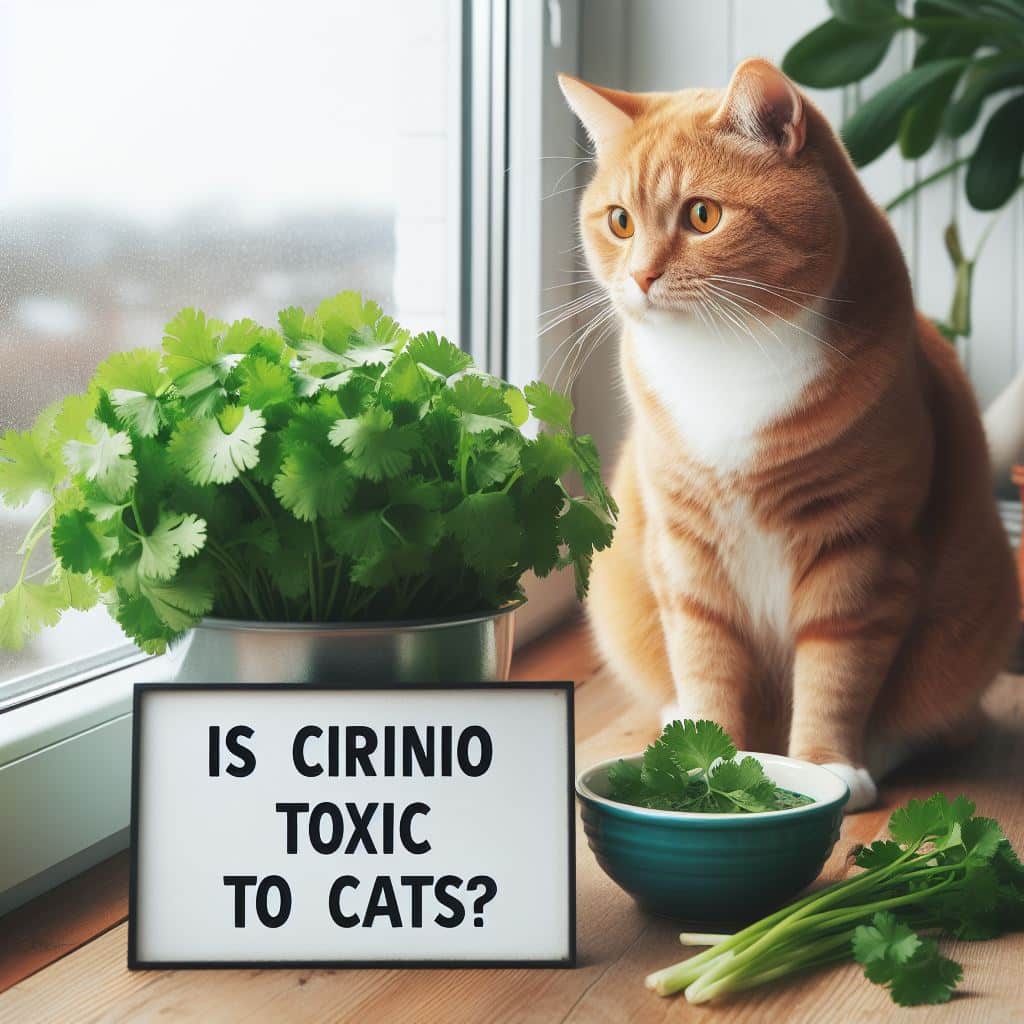Is cilantro toxic to cats? As a responsible pet owner, it’s important to be mindful of what you feed your feline friends. In this blog post, we’ll dive into the background of cilantro, common concerns about cilantro and cats, expert opinions on cilantro’s impact on feline health, potential health benefits of cilantro for cats, safe ways to introduce it into their diets, signs of cilantro toxicity, and the importance of seeking veterinary advice. Let’s separate fact from fiction and ensure the well-being of our beloved pets.
The Background of Cilantro
Is Cilantro Toxic to Cats?
Cilantro, also known as coriander or Chinese parsley, is a popular herb in many culinary dishes, particularly in Latin American, Middle Eastern, and Asian cuisines. This herb is well-loved for its bright, citrusy flavor and is often used to add a refreshing twist to recipes. However, it’s essential to understand the background of cilantro before considering its potential impact on our feline friends.
- Cilantro is rich in nutrients such as vitamins A, C, and K, as well as minerals like potassium and manganese.
- Its aromatic leaves and seeds have been used in traditional medicine for their potential anti-inflammatory and digestive benefits in humans.
Now, the question arises: is cilantro toxic to cats? This concern has led many cat owners to wonder whether this flavorful herb is safe for their pets to be around. It’s essential to explore this question thoroughly and consider expert opinions to ensure the well-being of our beloved feline companions.
Understanding the nature of cilantro and its traditional uses can provide valuable insights into how it might interact with our cats’ physiology. Let’s delve deeper into this topic to gain a better understanding of the potential impact of cilantro on our feline friends.
Common Concerns about Cilantro and Cats
Pet owners often wonder, “Is cilantro toxic to cats?” This common herb raises concerns due to the potential impact it can have on feline health. Here’s what you need to know about the common concerns regarding cilantro and cats:

Toxicity Risks: There is a concern among cat owners about the potential toxicity of cilantro to their feline friends. They worry about the adverse effects it may have on their cat’s well-being.
Digestive Sensitivity: Some cats may have a sensitive digestive system, and cilantro could potentially upset their stomach. This concern extends to how a cat’s body processes the herb and whether it can lead to gastrointestinal issues.
Allergic Reactions: Just like humans, cats can have allergies. Concerns arise regarding possible allergic reactions that cats may develop after consuming cilantro, leading to discomfort or health complications.
Food Preference: Another common concern is whether cats actually like the taste of cilantro. Pet owners may worry about their cat’s refusal to eat or the potential aversion to this herb.
Understanding these common concerns is crucial for responsible pet ownership. It’s essential to stay informed and consider these factors when contemplating introducing cilantro or any new food to your cat’s diet.
Expert Opinion on Cilantro and Cats
When it comes to the question, “is cilantro toxic to cats?” experts have varying opinions on the matter. While some believe that cilantro can be safe for feline consumption, others advise caution due to the potential risks involved.
Here are some key points to consider based on expert opinions:
Mixed Opinions: Veterinarians and animal nutritionists have differing views on whether cilantro is toxic to cats. Some believe that small amounts of cilantro may not be harmful, while others recommend avoiding it altogether due to the potential for adverse effects.
Individual Sensitivities: Like humans, each cat may have individual sensitivities to certain foods, including herbs like cilantro. While some cats may consume cilantro without any issues, others may experience digestive discomfort or allergic reactions.
Moderation is Key: If you choose to introduce cilantro to your cat’s diet, it’s crucial to do so in moderation. Start with a small amount and observe how your cat responds. If there are no adverse effects, you may continue to offer it occasionally, keeping the portions minimal.
Consulting a Veterinarian: Before making any significant changes to your cat’s diet, it’s advisable to consult a veterinarian. They can provide personalized advice based on your cat’s health condition, dietary requirements, and potential sensitivities.
Alternative Herbs: If you’re concerned about the potential risks of cilantro, there are alternative herbs that are considered safer for cats, such as catnip, parsley, or basil. These herbs can offer similar sensory stimulation without the perceived risks associated with cilantro.
In conclusion, while there are differing expert opinions on the topic, it’s essential for cat owners to approach the issue of cilantro consumption with careful consideration and awareness of their cat’s individual needs and sensitivities. Consulting a professional can provide valuable guidance in making informed decisions about your cat’s diet.
Potential Health Benefits of Cilantro for Cats
While there are concerns about the potential toxicity of cilantro to cats, it’s important to note that there are also potential health benefits when it comes to felines. Here are some of the positive aspects of cilantro for cats:

Nutritional Value: Cilantro is rich in vitamins A, K, and C, as well as several beneficial minerals. These nutrients can contribute to your cat’s overall health and well-being.
Digestive Aid: Cilantro contains antioxidants and fiber which can support digestive health in cats. It may help with issues such as constipation or indigestion.
Anti-inflammatory Properties: Some studies suggest that cilantro possesses anti-inflammatory properties. In cats, this could potentially help with conditions like arthritis or inflammatory bowel disease.
Fresh Breath: Believe it or not, cilantro can help freshen your cat’s breath. It contains natural compounds that can combat bad breath and improve oral hygiene in cats.
It’s important to remember that while cilantro may offer some health benefits to cats, moderation is key. Only introduce cilantro to your cat’s diet after consulting with your veterinarian to ensure it’s safe for your specific pet. Always monitor your cat for any adverse reactions, and if in doubt, seek professional veterinary advice.
By understanding the potential health benefits and risks, you can make informed decisions when it comes to incorporating cilantro into your cat’s diet.
Safe Ways to Introduce Cilantro to Cats
When it comes to introducing new foods to your feline friend, it’s essential to do so in a safe and gradual manner. The same goes for introducing cilantro to your cat’s diet. Here are some safe ways to introduce cilantro to cats:

Start Small: Begin by offering a tiny amount of chopped or crushed cilantro leaves mixed with your cat’s regular food. This will help familiarize your cat with the new scent and taste without overwhelming its palate.
Observe for Reactions: Keep a close eye on your cat for any signs of discomfort or allergic reactions after consuming cilantro. Symptoms of cilantro toxicity in cats may include vomiting, diarrhea, or excessive drooling.
Monitor Behavior: Pay attention to your cat’s behavior after consuming cilantro. If your cat shows aversion to the herb, it’s best to discontinue offering it.
Incorporate Gradually: If your cat shows no adverse reactions, consider gradually increasing the amount of cilantro offered over time. However, moderation is key, and it should never contribute to a significant portion of their diet.
Consult with a Veterinarian: Before incorporating cilantro or any new food into your cat’s diet, it’s always wise to consult with a veterinarian. They can provide personalized guidance based on your cat’s health status and dietary needs.
Introducing cilantro to your cat’s diet can be done safely by following these steps. However, ensuring that it’s consumed in moderation and doesn’t pose any harm is crucial for your cat’s well-being.
Signs of Cilantro Toxicity in Cats
If you’re concerned about whether cilantro is toxic to your feline friend, it’s essential to be aware of the signs of cilantro toxicity in cats. While cilantro is generally safe for cats in small amounts, consuming large quantities or concentrated forms may lead to adverse reactions. Here are some signs to look out for:

Gastrointestinal Distress: Cats may experience vomiting or diarrhea after ingesting large amounts of cilantro.
Loss of Appetite: Cilantro toxicity can lead to a decreased interest in food or complete loss of appetite in cats.
Lethargy: If your cat seems unusually tired or lacking in energy, it could be a potential symptom of cilantro toxicity.
Increased Thirst and Urination: Excessive consumption of cilantro may lead to increased thirst and frequent urination in cats.
Behavioral Changes: Watch out for unusual behavior such as agitation, restlessness, or uncharacteristic aggression.
It’s important to note that these symptoms may not be specific to cilantro toxicity and could indicate other health issues. If you notice any of these signs after your cat has ingested cilantro, it’s crucial to seek veterinary advice promptly. As with any potential toxicity, early detection and intervention are key to ensuring your cat’s well-being.
Seeking Veterinary Advice Regarding Cilantro
When it comes to your feline friend’s well-being, seeking veterinary advice regarding the introduction of new foods like cilantro is essential. If you are unsure about whether cilantro is toxic to cats, consulting with a veterinarian can provide you with valuable insights. Here are some important points to consider:

Expert Guidance: A qualified veterinarian can offer personalized advice based on your cat’s age, health status, and dietary requirements. They can provide information on whether cilantro can be beneficial or harmful to your specific pet.
Symptom Evaluation: If you suspect that your cat has ingested cilantro and is showing unusual symptoms, seeking prompt veterinary advice is crucial. A professional can assess any potential signs of toxicity and recommend the appropriate course of action.
Professional Recommendations: Veterinarians may offer alternatives to cilantro if it is not suitable for your cat. They can suggest safe and nutritious herbs or foods that align with your cat’s dietary needs.
Long-Term Health: Considering your cat’s long-term health and well-being, discussing the inclusion of cilantro in their diet with a veterinarian can contribute to informed decision-making and proactive pet care.
Remember, while the internet can provide valuable information, consulting with a veterinarian remains the best approach for personalized advice tailored to your cat’s unique circumstances.
Ensuring a Balanced Diet for Cats
When considering adding new foods or herbs to your cat’s diet, it’s essential to focus on maintaining a well-balanced and nutritious diet. While exploring the potential benefits of cilantro or any other new element, it’s crucial to ensure that your feline companions receive the necessary nutrients for their overall well-being. Here are some key points to consider when ensuring a balanced diet for your cats:
- Protein: Cats are obligate carnivores, meaning they require a diet high in animal-based protein. Ensure that their diet includes high-quality sources of protein, such as meat, fish, or poultry.
- Vitamins and Minerals: In addition to protein, cats need essential vitamins and minerals for their overall health. A balanced cat food should provide these nutrients, but it’s important to be mindful if introducing new elements, like cilantro, to their diet.
- Hydration: Cats often have a low thirst drive, so it’s crucial to ensure they have access to fresh water at all times. Wet food can also contribute to their overall hydration.
- Moderation: As with any new addition to a cat’s diet, moderation is key. If considering offering cilantro to your cat, it should be in small, controlled amounts and monitored for any adverse reactions.
- Consulting a Veterinarian: Before making significant changes to your cat’s diet or introducing new elements, including cilantro, it’s best to consult with a veterinarian to ensure it aligns with your cat’s individual health needs.
Ensuring a balanced diet for cats is not only crucial for their physical health but also for their overall happiness and well-being.
Remember, while cilantro may have potential health benefits, it’s vital to continue providing a nutritionally complete diet for your feline friends to keep them healthy and thriving.
Other Herbs and Plants to Be Cautious About
When considering the safety of various herbs and plants for cats, it’s essential to be aware of other potential hazards besides cilantro. Some other herbs and plants to be cautious about include:

Lilies: These are highly toxic to cats and can lead to severe kidney damage, so it’s best to avoid having them in a household with feline companions.
Tulips and Daffodils: These beautiful flowers contain toxins that can cause gastrointestinal upset and, in severe cases, heart arrhythmias if ingested by cats.
Mint: While cats may enjoy the aroma of mint, large quantities can lead to vomiting and diarrhea. It’s best to offer mint in moderation or under the guidance of a veterinarian.
Chamomile: Although chamomile is known for its calming properties, it’s essential to use it with caution around cats, as they may experience allergic reactions or gastrointestinal upset.
Aloe Vera: This popular household plant can cause vomiting and diarrhea in cats if ingested, and in severe cases, it may lead to tremors or changes in urine color.
Is Cilantro Toxic to Cats? It’s crucial to research and understand the potential risks associated with any herbs or plants before introducing them to a cat-friendly environment. Always consult with a veterinarian to ensure the safety of the environment for your feline companions and to make informed choices about their well-being.
Conclusion: Understanding Cilantro and Cats
In conclusion, it’s essential to have a balanced understanding of the relationship between cilantro and cats. While cilantro is generally safe for feline consumption, it’s crucial to be mindful of the potential risks and exercise caution. Here are the key takeaways:
- Moderation is Key: Feeding your cat small amounts of cilantro in moderation is unlikely to cause any harm. However, excessive consumption should be avoided.
- Signs of Toxicity: Keep a close eye on your cat for any signs of distress or unusual behavior after consuming cilantro. If you notice any symptoms such as vomiting, diarrhea, or loss of appetite, it’s important to seek veterinary advice promptly.
- Consulting a Vet: If you have any concerns about introducing cilantro or any other new food to your cat’s diet, consulting a veterinarian is always a prudent approach. They can provide personalized guidance based on your cat’s health status and dietary needs.
- Diverse Diet: While cilantro can be offered as an occasional treat, it should not replace the balanced, species-appropriate diet tailored to meet your cat’s nutritional requirements.
- Awareness of Other Hazards: Apart from cilantro, there are other herbs and plants that can pose risks to cats. Being aware of these potential hazards and taking preventive measures is crucial in ensuring your cat’s well-being.
By understanding the nuances of cilantro and its impact on cats, pet owners can make informed decisions regarding their feline companions’ diet and overall health. Remember, every cat is unique, so being attentive and responsive to their individual needs is paramount.
Frequently Asked Questions
Is cilantro Toxic to cats?
Cilantro is not harmful to cats. In fact, it can be beneficial for digestive health and may help reduce stress in some felines. As with any new food, it’s best to introduce cilantro in small amounts and monitor your cat for any adverse reactions.
Can cats eat cilantro?
Yes, cats can eat cilantro in moderation. Some cats may enjoy the taste and smell of cilantro, and it can be offered as a treat. However, it’s important to ensure that cilantro is fresh and free from any pesticides or contaminants before giving it to your cat.
What are the benefits of cilantro for cats?
Cilantro contains antioxidants and nutrients that can support a cat’s digestive system and overall health. It may also have calming properties that can help reduce anxiety in some cats. Introducing cilantro as a part of a varied diet can provide these potential benefits.
Are there any risks associated with feeding cilantro to cats?
Feeding cilantro to cats in excessive amounts may lead to digestive upset. Additionally, if the cilantro is not fresh or contains contaminants, it could pose a risk to the cat’s health. It’s important to use fresh, organic cilantro and offer it in moderation to avoid potential risks.
How should cilantro be prepared for cats?
Cilantro for cats should be rinsed thoroughly to remove any dirt, pesticides, or chemicals. It can be finely chopped and mixed with your cat’s regular food, or offered as a small, fresh leaf for them to nibble on. Always introduce new foods gradually and observe your cat’s response.
Exploring Plant Toxicity: Are Bromeliads Toxic to Cats?
Read More Now..






